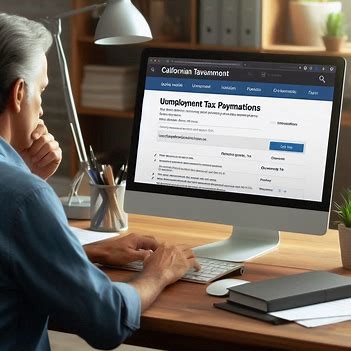The California State Unemployment Tax is a crucial component of the state’s unemployment insurance program. This tax, paid by employers, helps fund unemployment benefits for workers who have lost their jobs through no fault of their own. For employers, understanding how to accurately report and pay this tax is essential to ensure compliance with state laws and avoid costly penalties.
Statistics show that the standard unemployment insurance tax rate for new employers in California is approximately 3.4%. This rate can increase depending on the employer’s experience rating, with a maximum tax rate of 6.2%. Additionally, the taxable wage limit is capped at $7,000 per employee per year, meaning employers only pay the tax on wages up to that amount.
Table of Contents
ToggleWhat is Unemployment Insurance Tax?
The Unemployment Insurance (UI) tax is a state-mandated tax paid by employers to provide temporary financial assistance to workers who lose their jobs through no fault of their own. This tax ensures that employees receive compensation while they search for new employment. Employers are responsible for paying this tax to the state, which in turn funds unemployment benefits.
Who is Responsible for Paying?
Employers are solely responsible for paying the California State Unemployment Tax. Employees do not contribute to this tax. However, there are certain exemptions to this rule, such as for independent contractors and some non-profit organizations. Independent contractors are considered self-employed and, therefore, are not subject to unemployment insurance tax.
How to Register for Unemployment Insurance Tax
Establishing a Payroll Tax Account
Before paying the unemployment insurance tax, employers must first register with the California Employment Development Department (EDD). This process can be done online or through paper forms.
- Online Registration: Employers can register using the EDD’s e-Services for Business portal. You’ll need to provide your business name, owner details, Federal Employer Identification Number (EIN), and other relevant information.
- Paper Registration: Alternatively, you can complete and submit Form DE 1 (Registration Form for Commercial Employers) to the EDD by mail.
Confirmation and Account Number
After registering, you will receive a confirmation and an account number. If you register online, you’ll typically receive this number within 24 hours. For paper submissions, it may take up to 14 days. It is important to keep this account number safe, as it will be required for all future tax filings and payments.
Calculating the Unemployment Insurance Tax
Tax Rate Determination
The tax rate for unemployment insurance is determined by the employer’s experience rating, which reflects the employer’s history of layoffs. New employers in California typically start with a tax rate of 3.4% for the first two to three years. After this period, the rate may increase or decrease based on the number of unemployment claims filed by former employees.
Taxable Wage Limit
In California, the taxable wage limit is set at $7,000 per employee per year. This means that the unemployment insurance tax only applies to the first $7,000 of each employee’s annual wages. For example, if an employee earns $10,000, the employer is only responsible for paying unemployment tax on the first $7,000 of their wages.
Payment Methods for Unemployment Insurance Tax
Payment Frequency
The frequency of unemployment insurance tax payments depends on the employer’s total payroll tax liability. Payments may be required monthly, quarterly, or annually. It’s essential for employers to stay on top of their payment schedule to avoid penalties.
Online Payment Options
To make payments online, employers can use the EDD’s e-Services for Business portal. This system allows businesses to file reports, pay taxes, and manage accounts electronically. Acceptable payment methods include electronic funds transfer (EFT) and credit/debit cards.
- Step-by-Step Guide:
- Log in to the EDD’s e-Services portal.
- Select the appropriate filing option.
- Enter the payment amount and choose your payment method.
- Submit the payment and keep a confirmation of your transaction.
Mail-in Payment Options
For those who prefer to submit payments by mail, the EDD provides the necessary forms and addresses. Employers must include the correct forms, such as the Quarterly Contribution Return (DE 9), along with their payments. Payments should be mailed to the EDD before the deadlines to avoid late fees.
Filing Requirements and Deadlines
Required Forms
Employers must file certain forms when reporting and paying unemployment insurance tax. The two main forms are:
- Quarterly Contribution Return (DE 9): This form is used to report total wages and contributions. It is filed quarterly.
- Quarterly Report of Wages (DE 9C): This form is used to report detailed wage information for each employee.
Important Deadlines
Unemployment insurance tax reports and payments are due on a quarterly basis. Reports are due on the last day of the month following the end of the quarter. For example, for the quarter ending on March 31, the report and payment must be submitted by April 30.
Common Mistakes to Avoid
Underreporting Wages
One of the most common errors is underreporting employee wages, which can lead to penalties and interest charges. Employers should ensure they accurately report all wages paid, including bonuses, overtime, and other compensation.
Missing Deadlines
Failing to file or pay unemployment insurance taxes on time can result in fines and interest charges. It’s critical for employers to keep track of all reporting and payment deadlines to avoid these costly mistakes.
Incorrect Rate Calculations
Employers should verify that they are using the correct tax rate when calculating their unemployment insurance contributions. The rate can change each year based on the employer’s experience rating, so it’s essential to check with the EDD for the most up-to-date information.
Resources for Employers
EDD Resources
The California EDD provides a wealth of resources for employers, including forms, guidelines, and tax information. You can access these resources through the EDD website or the e-Services for Business portal.
Professional Assistance
For complex tax situations, employers may want to consult with a payroll professional or tax advisor who specializes in California tax laws. These professionals can help ensure compliance and prevent costly errors.
Online Tools and Calculators
Several online tools and calculators are available to help employers calculate their unemployment insurance tax liability. These tools can simplify the process of determining how much tax is owed based on wages paid and the applicable tax rate.
Conclusion
Understanding and complying with the California State Unemployment Tax is crucial for all employers operating in the state. By registering with the EDD, accurately calculating the unemployment insurance tax, and making timely payments, employers can avoid penalties and ensure compliance with state laws.
For employers, it’s essential to stay informed about tax rates, filing requirements, and deadlines. Using available resources and seeking professional assistance can help make the process easier and prevent costly mistakes. Regularly reviewing your tax practices and staying up to date with California’s unemployment insurance regulations will ensure smooth operations and compliance.


